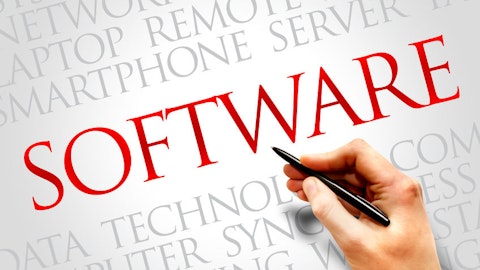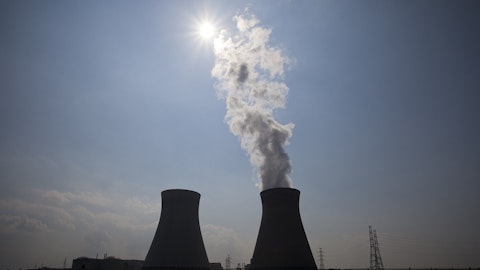Star Equity Holdings, Inc. (NASDAQ:STRR) Q4 2022 Earnings Call Transcript March 15, 2023
Operator: Greetings, ladies and gentlemen and welcome to Star Equity Holdings Inc.’s Fourth Quarter 2022 Results Conference Call. Please be advised that the discussions on today’s call may include forward-looking statements. Such forward-looking statements involve certain risks and uncertainties that may cause actual results to differ materially from those contained in the forward-looking statements. Please refer to Star Equity’s most recent 10-K and 10-Q filings for a more complete description of risk factors that could affect these projections and assumptions. The company assumes no obligation to update forward-looking statements as a result of new information, future events or otherwise. Please also note that on this call, management will reference non-GAAP financial measures, including EBITDA, adjusted EBITDA, adjusted net income and adjusted earnings per share, which are all financial measures not recognized under U.S. GAAP.
As required by SEC rules and regulations, these non-GAAP financial measures are reconciled to their most comparable GAAP financial measures in our earnings release issued this morning. If you did not receive a copy of the earnings release and would like one after the call, please contact Star Equity at 203-489-9500 or its Investor Relations representative, Lena Cati of the Equity Group at 212-836-9611. Also, this call is being broadcast live over the Internet and maybe accessed at Star Equity’s website via www.starequity.com. Shortly after the call, a replay will also be available on the company’s website. It is now my pleasure to introduce Rick Coleman, Chief Executive Officer at Star Equity.
Rick Coleman: Thank you, operator. Good morning and thank you all for joining us today. On the call with me today are Star’s Executive Chairman, Jeff Eberwein; and our Chief Financial Officer, Dave Noble. It’s a pleasure to be speaking with you today and is especially gratifying to report significantly improved results across both our Construction and Healthcare divisions. The strength of our fourth quarter 2022 consolidated financial results comes from significantly better operating performance, with improvements we made throughout the year, now beginning to show through in our financial results. Our Construction division delivered strong top and bottom line growth, resulting in fourth quarter adjusted EBITDA more than double that of the prior year quarter.
Our Healthcare division also performed well in the fourth quarter, with adjusted EBITDA up 79% year-over-year. Overall, we are beginning 2023 with a significantly improved operating portfolio. In addition, we continue to identify and investigate future acquisition opportunities either to expand our existing businesses or enter new lines of business. Now, I will focus on the results of our Healthcare division. In the fourth quarter, our Healthcare division revenue was $14.5 million or 6.7% lower than the prior year period. Our termination of two unprofitable product initiatives contributed to approximately one quarter of the total decline. In addition, two external factors contributed to lower total scanning revenue for the quarter. The first was the continuing national shortage of nuclear medical technologists, which we have discussed previously and the second was an approximately 6-week worldwide shortage of radiopharmaceutical doses caused by an offline nuclear reactor.
In the second quarter this year, we undertook a disciplined restructuring of our entire healthcare business. In addition to tightening our cost controls, we realigned management responsibility to leverage the strengths of our most talented employees. These changes were significant and we are now seeing the results of our efforts in our financials. Those changes, along with increased higher margin camera sales and robust scanning service margins, were significant contributors to our strong fourth quarter gross profit, which increased by 23%. Additionally, our gross margin percentage increased by 7 percentage points over the same period last year. Now I will touch on the results of our Construction division. Q4 Construction revenue increased 26% to $17.6 million versus $14 million in Q4 of 2021 and gross margin improved to 31% versus 27% in the same period last year.
The Construction division revenue increase was driven primarily by increased output at our EBGL business. The increase in gross margin percentage was due to significantly increased pricing levels to offset higher input costs in both residential and commercial projects as well as better risk management around building materials’ price volatility at both EBGL and KBS. Despite macroeconomic uncertainty across the construction space at large, we are a relatively small specialized player with a unique position in the market. In particular, we are experiencing secular growth in the areas of workforce housing, affordable housing, educational dormitories and buildings and environmentally sustainable housing. We have a robust pipeline for the first half of 2023 and are working on some exciting new business initiatives that we expect will continue to fuel our future growth.
Now I will turn the call over to David Noble, our CFO, who will provide additional fourth quarter consolidated financial highlights. Dave, please go ahead.
Dave Noble: Thank you, Rick, and good morning. Let’s now turn to Star Equity’s consolidated results. In Q4 of 2022, SG&A decreased by 0.1% versus Q4 of 2021. More importantly, SG&A as a percentage of revenue decreased meaningfully in Q4 of 2022 to 21.0% versus 22.9% in Q4 of 2021. This demonstrates good operating leverage embedded in our businesses, particularly on the construction side. Moving on to the Q4 bottom line results for Star Equity, we generated positive net income of $1.9 million compared to a net loss of $4.4 million in Q4 of 2021. Non-GAAP adjusted net income from continuing operations in Q4 was a positive $2.2 million. This compares very favorably to adjusted net income of $0.3 million in Q4 of 2021. Non-GAAP adjusted EBITDA increased to $3.1 million in Q4 from $1.0 million in Q4 of 2021.
This substantial improvement in consolidated adjusted EBITDA was primarily due to the continuation of our bottom-line focused turnaround at our Construction division, which began to bear fruit in mid-2022. Segment non-GAAP adjusted EBITDA at our Construction division sustained its upward trend, generating $2.9 million in Q4 this year, up from $1.2 million in Q4 of 2021. Consolidated operating cash flow for Q4 resulted in an outflow of $3.6 million versus an inflow of $1.7 million in Q4 of 2021. Q4 2022’s operating outflow was due to a large working capital buildup at our Construction division as we executed on significant projects at the end of 2022. We have experienced normalization of working capital so far in 2023 as we have collected cash on those projects.
I want to just briefly touch upon the progress we have made on the construction sites since acquiring these businesses 3-plus years ago. Construction revenue for the full year of 2022 was $57.1 million, up 19.1% from 2021. Gross margin percentage jumped to 22.2% from 6.3% in the prior year. Construction non-GAAP adjusted EBITDA for 2022 rose to $6.3 million from negative $2.7 million in 2021. In 2022, our Construction segment accounted for 51% of Star Equity’s total consolidated revenues. While this has been a multiyear effort, we are proud of the progress we have made in strengthening the management teams and repositioning these construction businesses. As of December 31, 2022, our consolidated balance sheet and liquidity were strong. The outstanding balance on our interest-bearing credit facilities was $11.7 million, while our cash balance stood at $4.7 million, leaving us with an overall net debt position of $7.0 million.
Now I’d like to turn the call over to the operator for questions.
Q&A Session
Follow Star Equity Holdings Inc. (NASDAQ:STRR)
Follow Star Equity Holdings Inc. (NASDAQ:STRR)
Receive real-time insider trading and news alerts
Operator: Our first question comes from Theodore O’Neill from Litchfield Hills Research. Please go ahead. Your line is open.
Theodore O’Neill: Sure. Congratulations on the good quarter. The question about the construction business, last quarter, the results were unfavorable in the quarter due to some €“ the timing. And I was wondering if there is also a counterbalancing in this quarter that makes it so good? Or can you give us some more information about that, please?
Dave Noble: Yes, there is always timing €“ go ahead, Rick, sorry.
Rick Coleman: No, you go ahead, Dave. I think we had the same thought. Go ahead.
Dave Noble: Yes. I guess what I would say is I would focus on the full year, which was tremendous. There is €“ there can be some timing differences from quarter-to-quarter, especially when we’re involved in large projects. So we did have one very large project last year that kind of crossed over the second and third quarter. But I would focus you on the full year results. I don’t know, Rick, if you have anything more to add on that.
Rick Coleman: No, that’s what I was going to say. It’s a bit lumpy when you look at it a quarter at a time.
Theodore O’Neill: Okay. And so correct me if I’m wrong, but in the healthcare side of the business, the shutdown of the reactor for making these €“ this radioactive stuff for use in the cameras, the imaging, is that something that you could know in advance it’s going to get shut down or has it come as a surprise?
Rick Coleman: No. This one came as a surprise. It was about a 6-week shutdown to a reactor in Belgium. They were doing routine monitoring of the performance of the reactor and determined some mechanical difficulties that required to shutdown for repairs. So during that period, we were unable to get the number of doses that we actually required. We were able to mitigate the effects somewhat by using lower doses for some scanning procedures, but definitely had an impact on the business.
Theodore O’Neill: Okay, thank you very much.
Operator: Our next question comes from Tate Sullivan from Maxim Group. Please go ahead. Your line is open.
Tate Sullivan: Hi, thank you. Good morning. Can you talk more about the first half construction pipeline that you mentioned in the mix? And did I hear you say in the remarks that EdgeBuilder had a stronger quarter in 4Q €˜22 than KBS in New England? Couple of questions there.
Dave Noble: Yes. Yes, sure. So, on the first question, in terms of the pipeline, I mean last year, we had a very, very large project. This year, the pipeline so far is made up of more single-family work. But the important thing about the pipeline this year is it’s all at the much higher prices that we put in place a year ago as a reaction to the increase in materials prices. So, obviously, lumber has come down a lot since then. We haven’t seen that as much with other building materials, but we are sustainably producing at much better margins today than we were even a year ago. So, we are very confident that our pipeline €“ although it’s more smaller projects right now, our pipeline is very strong. Having said that, we are in touch with a number of larger projects in the workforce housing arena that we expect one or more of those potentially to hit this year.
So, we are very confident that, that turnaround is sustainable. Our reputation is much greater today than it has been at any point in recent history. We are definitely seeing a lot more opportunity than we had previously. Now, obviously, there is potential economic headwinds ahead. We just haven’t felt that. We are a small player in the market, and so far, we are very confident in our first half pipeline.
Rick Coleman: One other thing I would add about the pipeline is that it’s not just the revenue opportunity that we see moving through the pipeline, but also a good match between the timing of the projects as well as our manufacturing capacity.
Dave Noble: Yes. And the second question about €“ I am sorry, the EdgeBuilder results in the fourth quarter, if you may remember, but we had a similar situation in the fourth quarter of the prior year. It’s just the nature of the business. The EdgeBuilder business had a number of large projects to execute towards the end of the year. So, when we say it had a better quarter than KBS, it’s not because KBS had a bad quarter. We just had a late year surge at EdgeBuilder like we had seen in the prior year. That business is very lumpy. As you know, it’s half of that business or a portion of that business is retail €“ sort of retail driven. It sells building materials to professional builders. And then the other piece of that business builds wallpapers. And those are rather large projects that €“ they come when they come. And we just had a large buildup towards the end of the year that we needed to execute into the end of the year.
Tate Sullivan: Okay, great. Yes, I see the 27% margin last year and 31% this year. And then, I mean the guidance still for building and construction or sort of what you have talked about before, gross profit margin annual target of greater than 20%? Is that still something to consider for €˜23 as well?
Dave Noble: Absolutely.
Tate Sullivan: Okay, great. And then you mentioned working capital buildup for the end of 2022, which is then €“ I mean so implying that you had accounts receivable collections to bring cash flow from operations closer to what you had in adjusted EBITDA in the first quarter or probably some inventory build. Can you just comment on potentially what the working capital will look like
Dave Noble: Yes. Just €“ it’s normalized a bit from the end of the year. We had a huge buildup, as I mentioned, on the EdgeBuilder projects. So, AR sort of balloon, but we have no collections problem whatsoever. In fact, we have collected a lot of older receivables on the KBS business last year as we focused on that. But we did have some €“ we obviously can’t talk about first quarter, but the cash that we would have expected to get in the first quarter did come in from those late year projects. So, things have normalized a bit.
Tate Sullivan: Yes. Okay. And then is it €“ were there any other abnormal items in SG&A? I know earlier in €˜22, you had some litigation costs in there. Was there any leftover litigation in 4Q €˜22 or was that passed?
Dave Noble: In Q4 very, very little. We were pretty much out of that legal litigation situation at the healthcare side of the business. So, we had a very small impact in Q4, and there is nothing remaining for this year.
Jeff Eberwein: Tate, this is Jeff. If you look at the EBITDA reconciliation table, in our press release, the items that were in SG&A in the fourth quarter were severance and retention costs, restructuring costs and there was just a small amount of litigation cost, $61,000. And that litigation really was a one-time item. It settled in the fourth quarter, and we are not expecting any expenses like that in 2023.
Tate Sullivan: Okay. Thank you, Jeff and thank you, Dave.
Operator: We have no further questions. I would like to turn the call back over to management for closing remarks.
Rick Coleman: Thank you, operator. Before concluding, I want to note that we are always available to take your call and discuss any additional questions. So, don’t hesitate to contact us. We will continue to share our story with existing and potential investors in the coming weeks. As always, we appreciate all our shareholders and your continued feedback and support. Thank you.
Operator: This concludes today’s conference call. Thank you for your participation. You may now disconnect.
Follow Star Equity Holdings Inc. (NASDAQ:STRR)
Follow Star Equity Holdings Inc. (NASDAQ:STRR)
Receive real-time insider trading and news alerts





